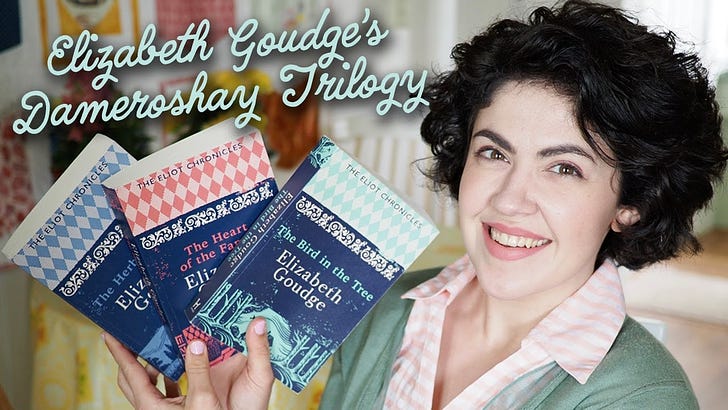Classic Elizabeth Goudge: The Dameroshay Trilogy
Beautiful quotations and inspiring insights from one of my favorite authors
Happy Saturday, friends! I hope everyone is having a great weekend. 😊 I’ve just been finishing up my reread of Elizabeth Goudge’s Dameroshay trilogy - when I filmed my review video that went up yesterday, I had just a few chapters of the third book, The Heart of the Family, left to go.
I ended up talking more about the first two books, The Bird in the Tree and The Herb of Grace, in the video, so I thought it would be fun to share a bit more (spoiler free!) from the The Heart of the Family, here in a blog post.
“How dear was this earth, its beauty the rumour of a habitation that could not be seen, and how dear the body of the man whose touch and look and word could tell her so little of what he really was. Yet it was the rumour that mattered. It was the so little that mattered; though afterwards one might wonder if one had only imagined them.”
Elizabeth Goudge certainly has a masterful way of describing the beauty of the earth and nature and the seasons, but what I find most powerful about her writing is how that “rumour of a habitation that could not be seen” is woven into every part of her works. There’s always a sense of the eternal life that lies just below the surface of the more obvious world, and the spiritual struggles of Goudge’s characters are just as, if not in fact more, important to the plot than ordinary actions and events.
She still walked in a dream world that endowed her with all the gifts and graces, and had never had a good look at herself, and found, to her misery and shame, that the attributes she most admired were the very ones that were missing. When that happened she would need to have someone there to tell her that it was not only what she had that was important to her, but what was missing; what she did about the gaps would play the larger part in the making or breaking of her soul. Lucilla was sure there would be someone, for it was her belief that for the children of many prayers - and all her grandchildren were that - the vital moments are always taken care of.”
As another character later asks, “How could one tell, as the moments flowed in and one held them and then relinquished them, which were great and which were not?” Reading Elizabeth Goudge always helps me to look at the world with new eyes, to remember that the unseen powers of prayer, courage, love (and Goudge’s representations of love are so much deeper and broader than just romantic love), awareness, discipline, selfishness, hatred and sin are vital forces, and the vital moments of our lives very well might not be the ones we would expect.
Lucilla’s prayers stretching out to connect her to her grandchildren is just one of many ways Goudge shows the interconnectedness of humanity. It’s a oneness that stretches through time and encompasses characters living in different generations.
“Caroline could never understand how women could dislike looking after an old house like this one. Did they never pause sometimes and sit quietly as she was sitting now, and remember the other women and feel their present toil a part of that past toil? A sort of freshness came when one did that, as though the work were a clean wind or a running river that lived for ever to cleanse impurities away.”
I’m going to try to remind myself of that quotation the next time I’m feeling annoyed at the prospect of doing chores! 😂 The old houses in all three books are so beautifully described and brought to life, and the inhabitants who used to live in them and left the stamp of their personalities on the places are a big part of that magic.
Dameroshay is an old stately home that Lucilla Elliot buys as a refuge for her family, and we learn all about its history in The Bird in the Tree. The Herb of Grace is an ancient pilgrim inn that we learn about in the second installment as we follow the continuing lives of the Eliot family. We do get to spend more time in Dameroshay and the Herb of Grace in The Heart of the Family, but it’s the richness and intricacies of the inner lives of the characters are the main focus of the third book. It is beautiful, but it does make for a denser reading experience, if that makes sense! I would say The Herb of Grace is my favorite from the trilogy, and it has, to my taste, the ideal balance of the spiritual reflections with a bit more action and story development. The Bird in the Tree also has a good balance, but there are some elements that aren’t really brought to fruition until The Herb of Grace.
I will leave you with one last quotation! I just love this sweet description of a feeling of happiness and expectation and being surrounded by God’s light:
“The first long parting that she and her father had ever known was over and he would be home today. Each time she remembered this it was as though a wave made not of water but of light broke over her head. She was drenched in light, and it had a glowing warmth that reached even to her toes. She looked at the world through it too, and the world shone and sparkled as though God had suddenly bent down and put a fresh polish upon it just to please her.”




I absolutely love that quote: "...rumour of a habitation that cannot be seen." How true it is of the good things in life! I definitely get that vibe in Goudge's stories I've read so far.